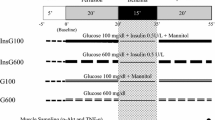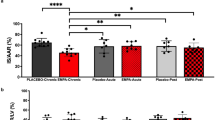Abstract
Objective: To study the effects of glucose-insulin-potassium (GIK) cocktail on cardiac myocyte apoptosis and cardiac functional recovery following myocardial ischemia/reperfusion (MI/R), and to further determine the role of insulin in the GIK-induced cardioprotective effect in vivo. Methods: Forty eight male rabbits were subjected to 40 min MI followed by R for 3 h and were randomly received one of the following treatments: saline, GIK (glucose: 150 g/L, insulin: 60 U/L and KCl: 80 mmol/L), or insulin (n = 16 in each group) at 1 ml·kg−1·h−1, beginning 30 min before MI and continuing throughout the 3 h-reperfusion. Blood glucose, electrolytes, arterial blood pressure and left ventricular pressure (LVP) were monitored throughout the experiment. Plasma creatine kinase (CK) and lactate dehydrogenase (LDH) activity were measured spectrophotometrically. Myocardial infarction and myocardial apoptosis (both DNA laddering and TUNEL analysis) were determined in a blinded manner. Results: MI/R caused significant cardiac dysfunction and myocardial apoptosis (both strong DNA ladder formation and TUNEL-positive staining). Compared with vehicle, GIK-treated rabbits showed protection against MI/R as evidenced by reduced myocardial infarction (19.7% ± 2.6% vs. 26.8% ± 3.3% of vehicle, n = 10, P < 0.05), marked decrease in DNA fragmentation and apoptotic index (11.0% ± 2.1% vs. 20.1% ± 3.1% of vehicle, n = 6, P < 0.01), significant decrease of plasma CK and LDH and improved recovery of cardiac systolic/diastolic function at the end of R. Treatment with insulin alone decreased blood glucose significantly but still exerted cardioprotective effects comparable with that of GIK. Conclusions: GIK exerts cardioprotective effects against postischemic myocardial injury and improves cardiac functional recovery in vivo. Insulin, mainly through the anti-apoptotic effect, plays a key role in the GIK-elicited myocardial protection in MI/R.
Similar content being viewed by others
References
Apstein CS, Taegtmeyer H. Glucose-insulin-potassium in acute myocardial infarction: The time has come for a large, prospective trial. Circulation 1997; 96: 1074–1077.
Apstein CS. Glucose-insulin-potassium for acute myocardial infarction: Remarkable results from a new prospective, randomized trial. Circulation 1998; 98: 2223–2226.
Sodi-pallares D, Testelli MR, Fischleder BL, et al. Effects of an intravenous infusion of a potassium-glucose-insulin solution on the electrocardiographic signs of myocardial infarction. A preliminary clinical report. Am J Cardiol 1962; 9: 166–181.
Opie LH. Glucose and the metabolism of ischaemic myocardium. Lancet 1995; 345: 1520–1521.
Fath-Ordoubadi F, Beatt KJ. Glucose-insulin-potassium therapy for treatment of acute myocardial infarction: An overview of randomized placebo-controlled trials. Circulation 1997; 96: 1152–1156.
Malmberg K. Prospective randomised study of intensive insulin treatment on long term survival after acute myocardial infarction in patients with diabetes mellitus. DIGAMI (Diabetes Mellitus, Insulin Glucose Infusion in Acute Myocardial Infarction) Study Group. BMJ 1997; 314: 1512–1515.
Diaz R, Paolasso EA, Piegas LS, et al. Metabolic modulation of acute myocardial infarction. The ECLA (Estudios Cardiologicos Latinoamerica) Collaborative Group. Circulation 1998; 98: 2227–2234.
Gao F, Gao E, Yue TL, et al. Nitric oxide mediates the antiapoptotic effect of insulin in myocardial ischemia-reperfusion: The roles of PI3-kinase, Akt, and endothelial nitric oxide synthase phosphorylation. Circulation 2002; 105: 1497–1502.
Gao F, Gong B, Christopher TA, Lopez BL, Karasawa A, Ma XL. Anti-apoptotic effect of benidipine, a long-lasting vasodilating calcium antagonist, in ischaemic/reperfused myocardial cells. Br J Pharmacol 2001; 132: 869–878.
Khoury VK, Haluska B, Prins J, Marwick TH. Effects of glucose-insulin-potassium infusion on chronic ischaemic left ventricular dysfunction. Heart 2003; 89: 61–65.
Zhu P, Lu L, Xu Y, Greyson C, Schwartz GG. Glucose-insulin-potassium preserves systolic and diastolic function in ischemia and reperfusion in pigs. Am J Physiol Heart Circ Physiol 2000; 278: H595–H603.
Tune JD, Mallet RT, Downey HF. Insulin improves contractile function during moderate ischemia in canine left ventricle. Am J Physiol 1998; 274: H1574–H1581.
Gottlieb RA, Burleson KO, Kloner RA, Babior BM, Engler RL. Reperfusion injury induces apoptosis in rabbit cardiomyocytes. J Clin Invest 1994; 94: 1621–1628.
Yaoita H, Ogawa K, Maehara K, Maruyama Y. Apoptosis in relevant clinical situations: Contribution of apoptosis in myocardial infarction. Cardiovasc Res 2000; 45: 630–641.
Zhao ZQ, Velez DA, Wang NP, et al. Progressively developed myocardial apoptotic cell death during late phase of reperfusion. Apoptosis 2001; 6: 279–290.
Saraste A, Pulkki K, Kallajoki M, Henriksen K, Parvinen M, Voipio-Pulkki LM. Apoptosis in human acute myocardial infarction. Circulation 1997; 95: 320–323.
Jonassen AK, Sack MN, Mjos OD, Yellon DM. Myocardial protection by insulin at reperfusion requires early administration and is mediated via Akt and p70s6 kinase cell-survival signaling. Circ Res 2001; 89: 1191–1198.
Ma XL, Kumar S, Gao F, et al. Inhibition of p38 mitogen-activated protein kinase decreases cardiomyocyte apoptosis and improves cardiac function after myocardial ischemia and reper-fusion. Circulation 1999; 99: 1685–1691.
Frustaci A, Kajstura J, Chimenti C, et al. Myocardial cell death in human diabetes. Circ Res 2000; 87: 1123–1132.
Oliver MF, Opie LH. Effects of glucose and fatty acids on myocardial ischaemia and arrhythmias. Lancet 1994; 343: 155–158.
Rogers WJ, Russell RO, Jr., McDaniel HG, Rackley CE. Acute effects of glucose-insulin-potassium infusion on myocardial substrates, coronary blood flow and oxygen consumption in man. Am J Cardiol 1977; 40: 421–428.
Author information
Authors and Affiliations
Rights and permissions
About this article
Cite this article
Zhang, H.F., Fan, Q., Qian, X.X. et al. Role of insulin in the anti-apoptotic effect of glucose-insulin-potassium in rabbits with acute myocardial ischemia and reperfusion. Apoptosis 9, 777–783 (2004). https://doi.org/10.1023/B:APPT.0000045796.58715.82
Issue Date:
DOI: https://doi.org/10.1023/B:APPT.0000045796.58715.82




